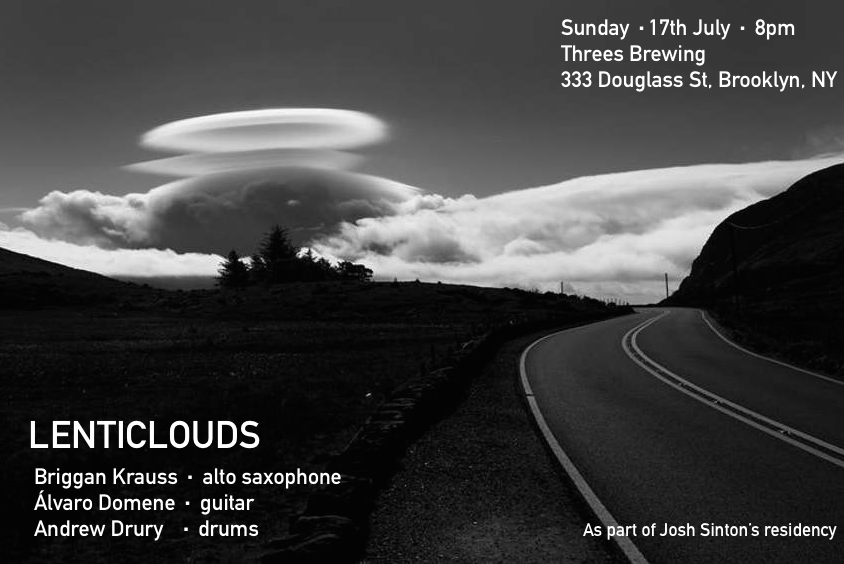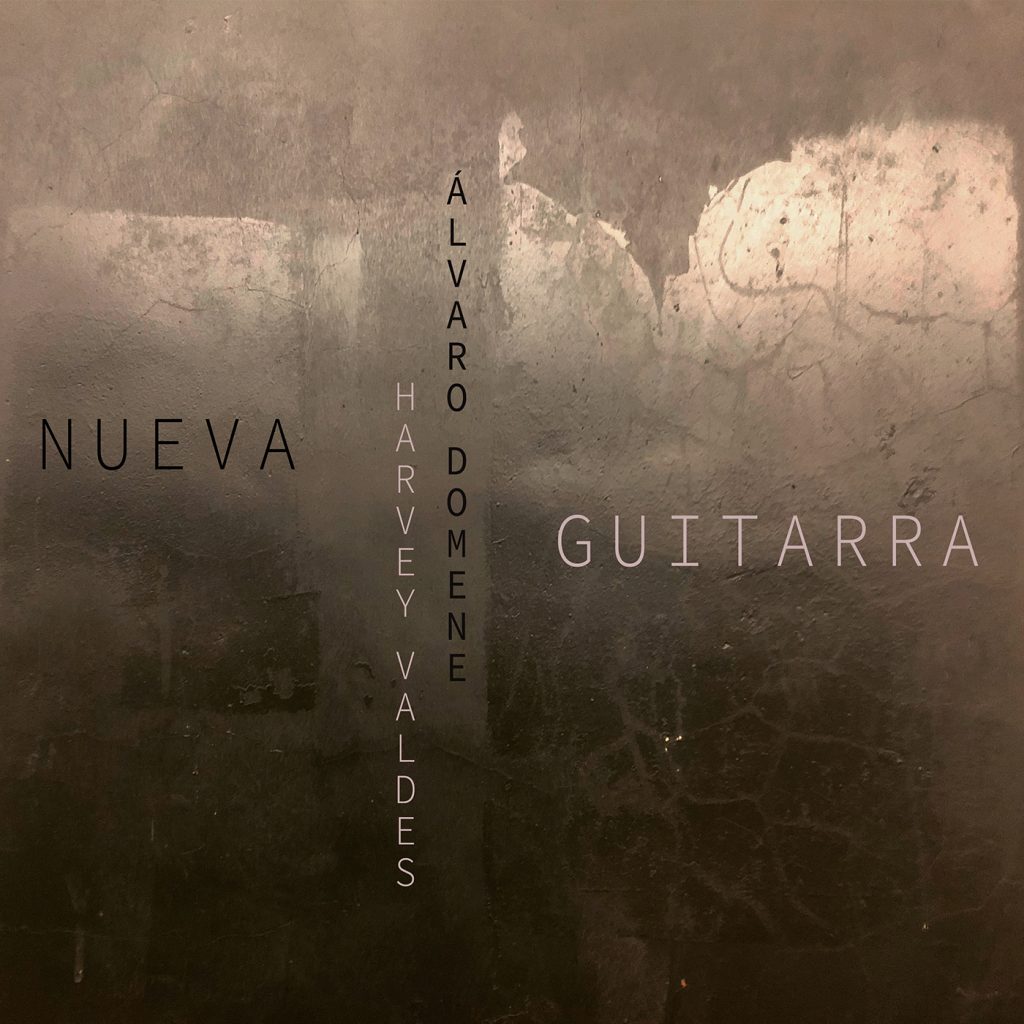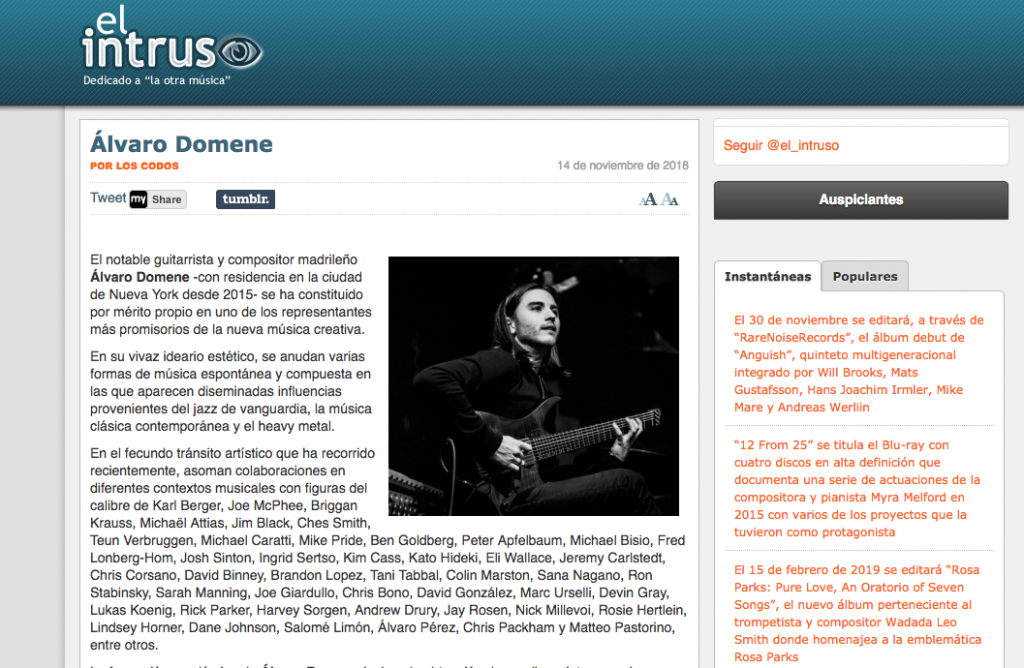· 4th of March 2024 ·
Stereogum just published an article-interview written by Ian Chainey in which we discuss some of my background and process. Have a look
· 4th of August 2023 ·
Fellow guitarist-composer Max Kutner has created a blog through which to share his thoughts on music releases that have caught his attention. I’m elated and honoured that he chose RAPID INFLUX as one of his first records to discuss. Read his review below and then make sure you check out Max’s work:
“A wild and busy foray into a shattered, abstracted world, the listener is freely propelled through IDM, technical death metal guitar, glitching loops and icy computer noise. This is music to listen THRU as much as it is to listen to.
Kingston-based artist Álvaro Domene is one of the most inventive and hyper-productive guitarist-composers in the world. For starters, he has released 19 either solo or collaborative efforts since 2020. I’m not kidding. Look it up. It’s staggering. I find the dialogue he initiates between virtuosic guitar playing and various programmed drum machines and algorithms to be his most fascinating vehicle for expression.
With each addition, his methods and sounds have evolved exponentially into ever more nuanced aggressive visions which are realized in the form of sweeping and vast musical landscapes. Every second of every piece on Rapid Influx feels like another massive bomb detonating. The sound of the tracks here (and on other releases) is that of fractured sonic debris whizzing past your ears from every direction. Think Venetian Snares meets Atheist but about 100x more intense and you get somewhat of an idea of the character of Rapid Influx. It’s an overwhelming but highly rewarding experience to these ears at least!
I’m giddy every time Álvaro shares something new with the world and enjoy having my head smashed by their brilliance like one of Gallagher’s unfortunate watermelons. Furthermore, the label he uses to release items – Iluso Records – has an impressive roster of likeminded incendiary artists that includes Henry Kaiser, Harvey Valdes, Álvaro Pérez, Briggan Krauss and Colin Marston to name a few.
If anyone is wondering, my favorite of the seven tracks here is “Shaken Out of Lethargy” which could nearly sum up the experience of encountering any of Álvaro’s recent work.” – Max Kutner
· 1st of February 2023 ·
Here is an article with bits of interview that Álvaro Pérez and I did with Andrey Henkin apropos of the debut release of our ADAPAR project: https://brooklynrail.org/2023/02/music/Blood-Brothers
· 8th of January 2023 ·
The Conlon Nancarrow Award for Excellence in Truly Baffling Music
“We have all internalized the rules of music for our culture to a degree that it’s inseparable from our ability to evaluate music. I have hardwired expectations for what “should” happen in a piece of music, and it’s pleasing when those things happen. It’s a stimulus/response thing that just taps into feedback loops that I don’t really control. And yes, the rules I’ve internalized are those of western music, but whatever tradition I grew up in, it’s programmed into me. Even avant garde stuff that explicitly breaks the rules is still experimenting within that framework by testing and expanding the boundaries of it. I recognize what they’re doing as a reaction to the rules.
And then there’s stuff that sounds like it’s from another planet. Records that seem completely unbound by convention rules of “melody” or “aesthetics” or “predictability”. There’s probably some internal logic to them, but they’re so far out there that it’s hard to really recognize it as the same sort of thing as, I dunno, an Archers of Loaf record or whatever. Conlon Nancarrow, by writing stuff for player piano and really testing the limits of rhythm, is a good example. And so is the winner of this award, Not Arbitrary by Álvaro Domene, which sounds like it is a response record to Voyager 1’s golden record. But we haven’t actually been able to decipher it. Domene conjures things from his guitar that, frankly, I’m not entirely sure what they are or how he does it.
Why do I like this? I dunno, sometimes it’s fun to be disoriented. If I want something that tickles my brain with pattern recognition joy, I have literally thousands of records in my collection that can do that. If I want something that, every time, will make me go “what in the hell was that?”, I only have a small handful. And that’s a rare gift.” – Joshua Buergel
· 22nd of July 2021 ·
“Tercera Vía”, one of Spain’s most popular radio shows for classical and creative music featured Zodos, my duo album with Álvaro Pérez, extensively during a recent broadcast. JM Sebastián really got it. Have a listen.
· 2nd of October 2020 ·
Today, the pre-order for my new solo record “Illustris” was launched along with this video for the title track.
Enjoy!
· 17th of August 2020 ·
I hope this note finds you well, safe, and healthy, in these difficult times.
My friend Dane Johnson and I just released the pre-order for our new duo record, Beneath The Earth There Are Machines, and we also have a fantastic video to go along with it. Check it out.
· 1st of May 2020 ·
Happy International Workers’ Day
My friend and extraordinary guitarist Harvey Valdés and I have released the pre-order of our new duo record Nueva Guitarra. Coincidentally, Bandcamp is waiving its fee today to support musicians in these uncertain Covid19 times, so your purchase goes 100% to us. Grab a digital copy on Bandcamp.
I thank you for your support, and truly hope you are staying safe and healthy.
· 16th of July 2019 ·
Watch Phonon’s live debut at Brooklyn Bazaar. We are recording an album next week.
· 14th of November 2018 ·
For my Spanish-speaking friends, here is a great interview I recently did for Sergio Piccirilli and the fantastic music news website El Intruso. Thank you Sergio and everyone working at El Intruso for their kind support.
· 1st of August 2018 ·

IN-DEPTH INTERVIEW WITH MICHAEL ROSS AT GUITAR MODERNE
Follow this link for the edited version. Otherwise, keep reading for the original:
“More and more guitarists are experimenting with noise. Making noise with a guitar is easy; making music with noise, not so much. Álvaro Domene has mastered the art of turning non-pitched abrasive sounds into a kind of beauty. “Beta Particle,” on his record The Compass offers up a glitchy din ala Stian Westerhus, but with Domene’s personal stamp all over it. Elsewhere, ambient clean tones morph into Wagnerian waves of distortion, as he employs the entire range of his 7-string guitar. He joins a growing number of European-born players making, er, noise on New York City’s modern guitar scene.”
What kind of music were you playing when you first became proficient on the instrument?
I suppose it depends on how you define proficiency. I will give you some background:
I’m originally from Madrid, Spain, and moved to the USA in 2014. I also lived in London, England, between 2007 and 2011. My mother played guitar growing up, mostly Spanish folk music, so I grew up with an old Spanish guitar as part of my toy collection. My grandfather played classical guitar and lute, and he probably was the first musician I ever saw in person, when I was an infant. He showed me my first guitar chords when I was about 10, and I was completely fascinated by the sounds that he produced on those instruments. Though I first picked up the guitar then, I didn’t become disciplined about it until age 14. From that moment on, I knew music would play a major role in my life. I started practicing obsessively, learning songs from records, scales and harmony from books, etc. I also started writing music and forming bands right away. At around that time, I felt I needed some direction since I felt overwhelmed with the amount of information that I was finding (this was around 2000) so I searched and found my first teacher, who was a fantastic jazz guitarist. It got serious quickly.
I started learning jazz tunes, transcribing, sight-reading, etc. I was training to be a jazz guitarist, because I thought that, given my serious interest in improvisation, that should be my path. I was completely obsessed, so much that I would often skip high-school to stay home and practice. I wasn’t playing in a jazz group though, that came a bit later, but throughout my teens I played in different rock and metal bands with experimental and progressive elements that I would bring from my jazz lessons and own research. Some of the artists that influenced me at the time were Led Zeppelin, Rage Against the Machine, Tool, Allan Holdsworth, Mr Bungle, Miles Davis, Faith No More, John Coltrane, Black Sabbath, Kyuss, Joaquín Rodrigo, Meshuggah, Paco de Lucía, King Crimson, Pat Martino, Sepultura, Dillinger Escape Plan, Slayer, Pat Metheny, early Korn, Pantera, Fantomas, Wes Montgomery, Aphex Twin, etc.
What led you to create more experimental (non-mainstream) music?
Growing up, I never saw music in terms of genres, for me they were just different ways of dealing with sounds. It was perfectly natural for me to go from a Coltrane record, to Gorguts, to Frisell, to Mompou. Still is. Don Caballero, Mr Bungle, Sunn O)))… they all have a substantial unconventional factor to which I was highly attracted.
I went to study jazz at Middlesex University in London because, due to my deep interest in improvisation, I thought I wanted to be a jazz guitarist. The problem is that the concept that I had in mind of what jazz was, didn’t quite match the reality of what “jazz” is considered by most people or what’s left of the industry (I was clearly aligned with the “avant-garde”, I just wasn’t fully aware of it yet). I studied the music of Louis Armstrong, bebop, postbop, etc. I felt like there were a few key elements that I found to be missing in most conventional jazz, especially the emotional content and the clearly rigid boundaries between composition and improvisation, so I became generally dissatisfied with the sonic and conceptual limitations of post-bop music. I love jazz, but I find that it can be way too polite, safe, predictable, and sterile, especially nowadays.
So, the desire to explore structure and abstraction, sound, the line between the pre-composed and the spontaneous, instrumental techniques, the emphasis on collective musical dialogue, and the lack of a clear hierarchy within a group, were pointing me in a clear direction. I discovered that my profile seemed to have a lot of commonalities with the avant-garde traditions (in jazz, classical, and metal), and that I could really express myself artistically under that light, so there I went.
Why do you think many schooled guitarists are venturing into free improvisation?
I believe that, when it is at a high level, spontaneous composition can be the purest, most moving, sophisticated, instinctive, mysterious, and most satisfying way of creating music. So, if you are a well-formed and open minded musician, those characteristics are probably going to sound utterly attractive to you. I see a lot of classical guitarists who are absolutely exhausted, uninspired, and miserable due to the rigidity of their repertoires, and spontaneous composition can be a very attractive, liberating, and deeply fun activity for them. In the right conditions, the process is able to alter our state of consciousness, becoming quite a spiritual and fulfilling experience for everyone in the room.
Whose music inspires you? Past and Present.
Too many to mention but, besides everyone with whom I work, here are some names:
Evan Parker, John Coltrane, Anthony Braxton, Earle Brown, Iannis Xenakis, Morton Feldman, Gyorgy Ligeti, Anton Webern, Giacinto Scelsi, Paul Motian, Tim Berne, Roscoe Mitchell, Elliott Carter, Craig Taborn, Lustmord, Ornette Coleman, Mike Patton, Wormed, Pig Destroyer, Suffocation, Pauline Oliveros, Albert Ayler, Bach, Krallice, Arve Henriksen, Gorguts, Meshuggah, Bela Bartok, Portal, Krzysztof Penderecki, Car Bomb, MJ Keenan, Aphex Twin, Matt Mitchell, Khanate, Olivier Messiaen, Sigur Ros, Federic Mompou, and Gerard Grisey.
Since this is a guitar-focused site, here’s a list of guitarists that I have found inspiring throughout the years: Paco de Lucía, Derek Bailey, Allan Holdsworth, David Torn, Bill Frisell, Marc Ducret, Hilmar Jensson, Henry Kaiser, Elliott Sharp, Adam Jones, Dan Lippel, Luc Lemay, Ben Monder, Adam Rogers, Matte Henderson, Stuart Hall, and Stian Westerhus.
Here are some guitarist friends and peers whom I also find inspiring and deserve more attention than they get: Miguel Ontivero, Harvey Valdés, Dustin Carlson, Brandon Seabrook, Dane Johnson, Chris Sharkey, Lucas Brode, Matteo Liberatore, Aaron Quinn, Nick Millevoi, and Ryan Miller.
How did you get better at your current style?
To me, both performing on guitar and composing music benefit from pretty much the same method with some adjustments: envisioning what I want to accomplish, research and study, practice, work with people who are more experienced than me (I have been the youngest member in pretty much every group in which I have ever played), reflecting on those processes with honesty, and repeating and improving upon them as often as I can, to the best of my abilities.
Also, something that I find rather helpful is to not only be aware of my limitations and address them with a serious practice regime, but also recognize aspects of my playing/composing that come perhaps more naturally to me, and exploit them. My new solo album, The Compass, is to me an example of this strategy.
Which guitars, amps, effects, plug-ins and software do you use to create your music? In general and on this record. (What are you using for the glitch effects?)
In general, I like valve amplifiers and pedals, but I am quite open and will try and employ anything that I feel enables the manifestation of my musical vision.
My strategy with equipment has always been the same. I start with a sound in my imagination that needs to come out of the speaker and try to find a way to achieve that, first with my hands, and then, for certain ideas, external help is necessary, especially for time-related activities that I frequently envision in my head, like having different lines going in opposite directions and tempos from each other, retrograde/inverted and expanded/contracted versions of an original line or texture, and many alterations of that concept. Part of my vision is the application of certain serial compositional techniques in real time, which allow me to unravel an entire piece in a spontaneous manner.
I always liked glitchy sounds. The first stutters I heard were done by Adam Jones using the pickup selector of his Les Paul on Tool’s Opiate and Don Caballero on American Don, which was accomplished with a Boss DD3 on hold mode, I believe. I bought that pedal for that purpose a long time ago. I also have been into Aphex Twin, Autechre, and Ikue Mori for a long time, and they all use those sounds rather extensively and in a very creative manner. I really enjoy the tactile and immediate response I get from pedals and also love the flexibility that I get from devices that can deal with macro and micro sampling, as opposed to using a computer, which I try to avoid.
For the new record, The Compass, and pretty much everything I’m doing these days, the signal chain is the following (except amp setup), Strandberg guitar into:
Zvex Fuzz Factory, Xotic SP Compressor, EHX Micropog, HD Precision Drive, Weehbo Bastard, Volume Pedal, Hexe Revolver, Red Panda Tensor, Strymon Timeline, Neunaber Wet, and EHX 720 Looper. All these into a Peavey 5150 EVH (original block letter) through a 4×12 Boogie cabinet, a 70s Fender Twin Reverb, and a 70s Ampeg SVT bass amp, through a 4×10. All cranked to 11, at Menegroth, Colin Marston’s studio in Queens, New York.
For glitch effects, it depends on to what type you are referring, but I use my hands and objects (plectrum, saxophone reeds, springs, and screws) in combination with the Timeline, Revolver, and Tensor. I also use a cello bow sometimes.
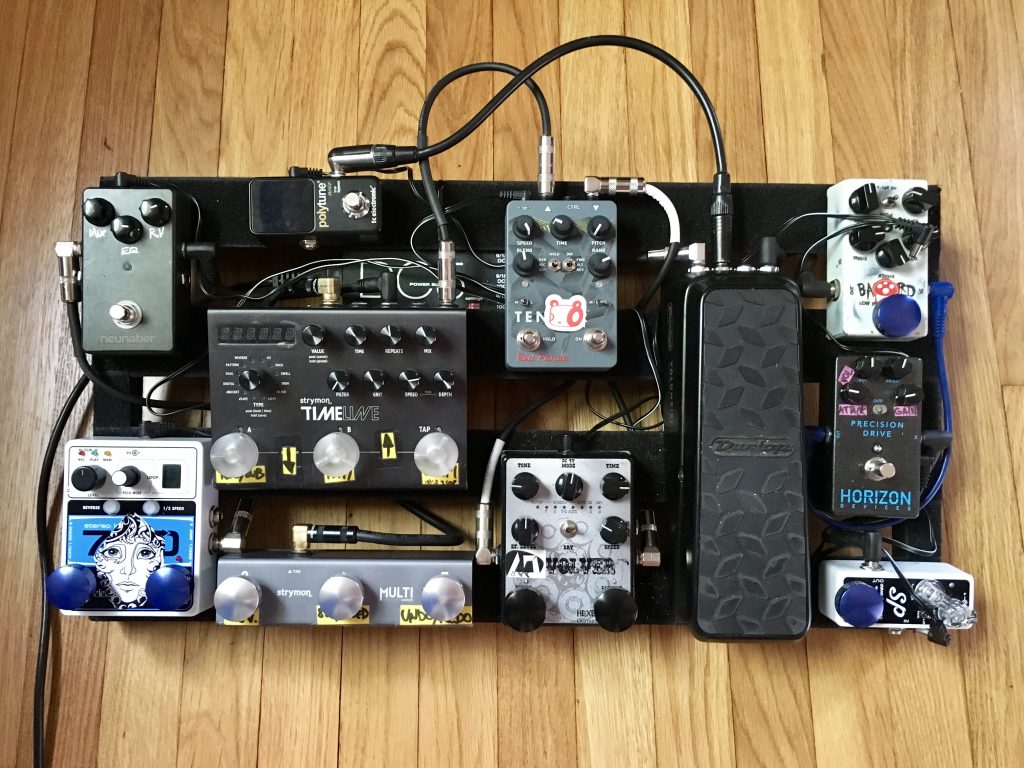
Why a 7-string guitar?
Range! The extra string gives greater depth, and it opens up many sonic possibilities, melodic, harmonic, and textural. I have been always deeply attracted to low frequencies but never quite enjoyed playing electric bass, so I find this to be the best solution for me at this moment. I find 8 string guitars a tad uncomfortable to play and challenging to amplify properly, so I settled on 7.
I play in numerous bass-less groups and love the flexibility and harmonic space that that situation brings and, by having the 7th string, I can get into bass territory really easily when the music needs it.
Another reason is sound clarity. I loved tuning down my Gibson 335, the guitar I played for the last 10 years, but the sound would always be a bit muddy, unclear, and the intonation would be a bit off, no matter what I tried. That gets fixed the moment you get a 7th string, or a baritone 6. I decided a 7 was the right choice for me because I didn’t want to compromise my access to the standard tuned strings by playing a baritone 6. Fortunately, the Strandberg features a multi-scale neck, so the low strings are on baritone territory, allowing for good tension and great intonation throughout the entire range, which translates into a lot of clarity in the sound. The other strings are on 25.5 inch scale.
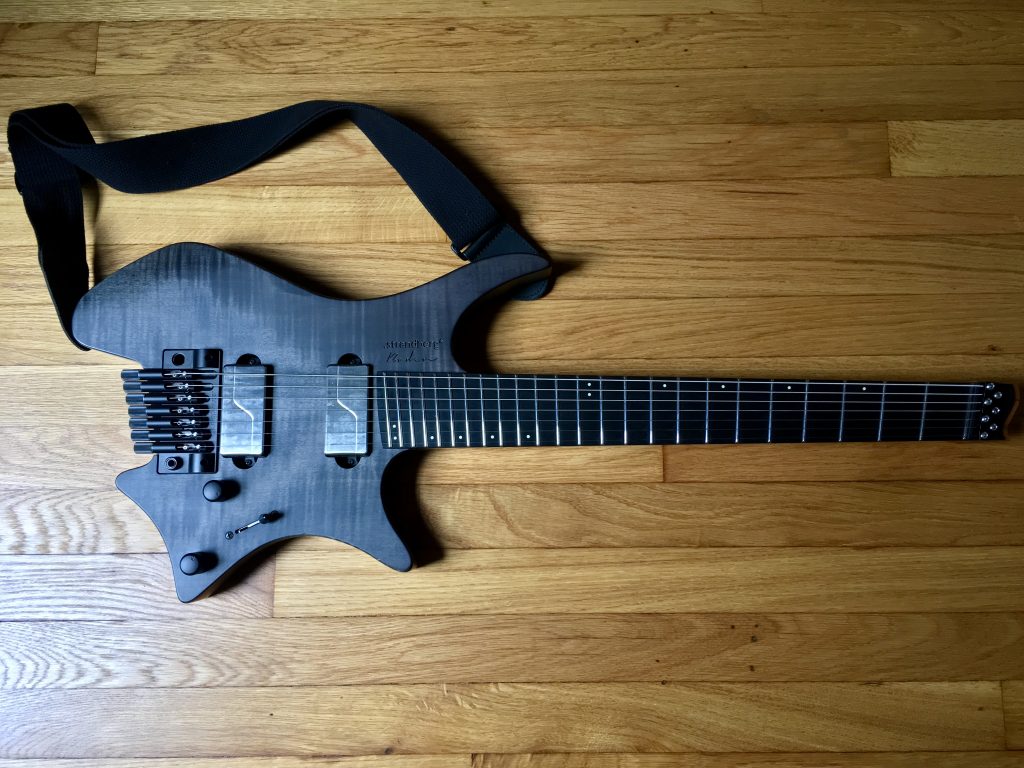
In the live videos, is the 335 tuned down or are you using a pitch-shifting pedal?
I don’t know exactly to what videos you are referring, but it was probably a combination of both. I used to tune down the low E string to D, C, B, A, and even F# on the 335, and have also used sub-octave effects in the past, including Boss Oc2, Oc3, Digitech Whammy, and EHX Micropog. I have yet to discover one that I truly like, though. I feel that using a sub-octave pedal is always a compromise, so I now use it sporadically.
Tell me about ZÖBIK-3
It was a trio that I formed with Álvaro Pérez, a great alto saxophonist, when I returned to Madrid after living in London for a while. It was 2011-12, and the project lasted until 2014. I wrote the majority of the music that we performed and also defined the aesthetic of it, which was based on a jazz/rock/metal hybrid. We played the city’s circuit, released a record that got positive press, and did some touring around Spain. It was rather challenging to keep alive a project like that in Spain due to the financial crisis and lack of opportunities, so we put it on hold and went our separate ways.
What do you think is the connection between Metal and Free Improv?
I think common and connecting elements could be: uncompromising musical ferocity, functional democracy, raw energy and visceral power, the sheer volume, and the anti-establishment ethos. Always assuming we are talking about consistently loud and “dark” free improvisation, of course.
Interestingly enough, I find it quite challenging to find musicians who manage to simultaneously utilize both refined improvisation skills and the said ferocity of heavy music in a successful way.
Which do you enjoy more: recording or playing live and why?
I enjoy both activities, but I absolutely love and live for the experience of making music on stage. The reasons are: the synergy among band members and audience, the risks, the ephemeral and unique quality of the performance, the social aspect, the discovery of new places, etc. I have to say that the way I have been making records in the studio has always been very fast, usually in one or two days, if lucky, mainly due to budget constraints, so I’m quite sure that that fact influences my take on this.
Who else would you like to collaborate with and why?
I’m very fortunate to collaborate with some of my favourite musicians in the world on a regular basis but, off the top of my head: Evan Parker, Björk, Arve Henriksen, Tim Berne, ICE, MJ Keenan, Roscoe Mitchell, JACK Quartet, Mike Patton, Tyshawn Sorey, Can Buyukberber, Craig Taborn, Alberto Bustos, Stewart Lee, and Charlie Brooker. The reason is the same for all of them; I feel that their work resonates with me, and I believe that the collaboration would be complementary, successful, and a lot of fun. Having said that, I am always open to collaborate with committed artists with strong personalities and ideas, regardless of discipline.
How have you built up an audience for your music?
That is an ongoing and challenging process, but besides the traditional ways of getting my name out there by performing as much as I can and putting out records, establishing and maintaining a strong social media presence is critical in today’s world. It definitely can help broaden your audience and student roster.
Something new that has positively affected my situation is the fact that last year I started curating a monthly concert series in Kingston, upstate New York, called Singularity Music Series, where some of the top ground-breaking creative musicians in New York and elsewhere come up to perform for a small audience in an intimate and comfortable setting. A wonderful byproduct of my assisting others disseminate their art, is the fact that the reception and spread of mine is being positively affected. I’m very proud of the work we have done so far with the series and look forward to the future. We have exciting plans for it. I have always believed that in order for you to receive from a community, you need to contribute in any way that you can, and that’s part of our philosophy with Singularity and also Iluso Records, which I run with my friend and exceptional drummer-composer Michael Caratti. We started releasing music in 2013 and now we are about to release our 13th record.
In general, what are you trying to convey with your music?
Musically, I prepare myself to be able to reach a state of flow, and strive to push myself out of familiar territory to raise my consciousness and level of awareness, and by doing so, hopefully take the listeners with me on the journey.
I think that what the music conveys is the level to which I’m able to express musicality with the tools (not only musical) that I have developed up until that precise point the music is occurring. I believe that being well prepared is what allows me to play what I hear, to be authentic, true to myself, and to express whatever is coming through me at the moment. As an immigrant in 2018 USA, it’s a daily struggle for me not to feel infuriated, frustrated, and hopeless; so, if I’m being honest with myself, all those emotions have to somehow be expressed. The result and consequences of the latest election in the USA definitely acted as a catalyst for the general sense of despair, angst, and drive in The Compass. At the same time, and approaching this from a different angle, I think that whatever listeners experience in the music, is what the music is expressing, at least to them.
What is your latest project? When will it be available and where can people in different parts of the world get it?
I just released my very first record of solo guitar works, The Compass (Iluso Records). It features 10 pieces, half of which I composed in the months prior to the session, and the other half were spontaneously created in the moment. I have been inspired by my studies of Webern, Scelsi, and Xenakis’ music and that is reflected in the sonic vocabulary of the pieces, though through a metal and improvisation lens. It’s loud, and I had a phenomenal time recording it at Colin Marson’s studio, Menegroth, in New York. He also did the mixing and mastering. And (I’m getting this question quite often) no, there were no overdubs, it was all live.
It just got picked by Avant Music News as record of the week, along the “new” Coltrane record and a couple other great albums, which is quite surreal and humbling to me.
The Compass is available now, in both CD and download, from Iluso Record’s Bandcamp
If you are in New York, you will also be able to get the CD at the Downtown Music Gallery.
Besides my solo pursuit, I have a few other projects, usually active in New York:
Lenticlouds: improvising trio with saxophonist Briggan Krauss and a drummer from a rotating cast (Ches Smith, Mike Pride, Andrew Drury, or Lukas Koenig)
Leaving The Sky in Splinters: trio with drummer Kate Gentile and bassist Kim Cass, in which we play compositions of mine.
dMu: improv-metal trio with Mike Caratti and baritone saxophonist Josh Sinton. Our first record, Synaptic Self, got a lot of nice press. Here it is
Duo with Briggan Krauss: We made this record.
I’m also working on a piece for string quartet that I hope to finish by the end of the year and record it in the new year. One of the peculiarities of it is that there will be a part for 7 string electric guitar in it.
And something recent is that I’m also playing in Karl Berger’s new band, along with Ingrid Sertso and Michael Bisio, and we will be recording and performing in the upcoming months.
Thank you very much for the interview, Michael.
· 18th of June 2018 ·
“THE COMPASS” is out TODAY!
CDs and Downloads available HERE
Play it…
L O U D
· 16th of May 2018 ·
It’s been a while since the last update. Here is the cover art for my new upcoming release, “The Compass”, which will be released in June through Iluso Records. The concept and design are by Juan Soler at The Braves Church, in Spain.
“The Compass” is my very first solo album and I am very excited to release it. It contains pieces that I wrote for the seven string electric guitar, plus spontaneous compositions. It was performed and recorded live, without overdubs, on the 1st of March of 2018 at Menegroth, The Thousand Caves, New York. And, it was recorded, mixed, and mastered by the brilliant Colin Marston.
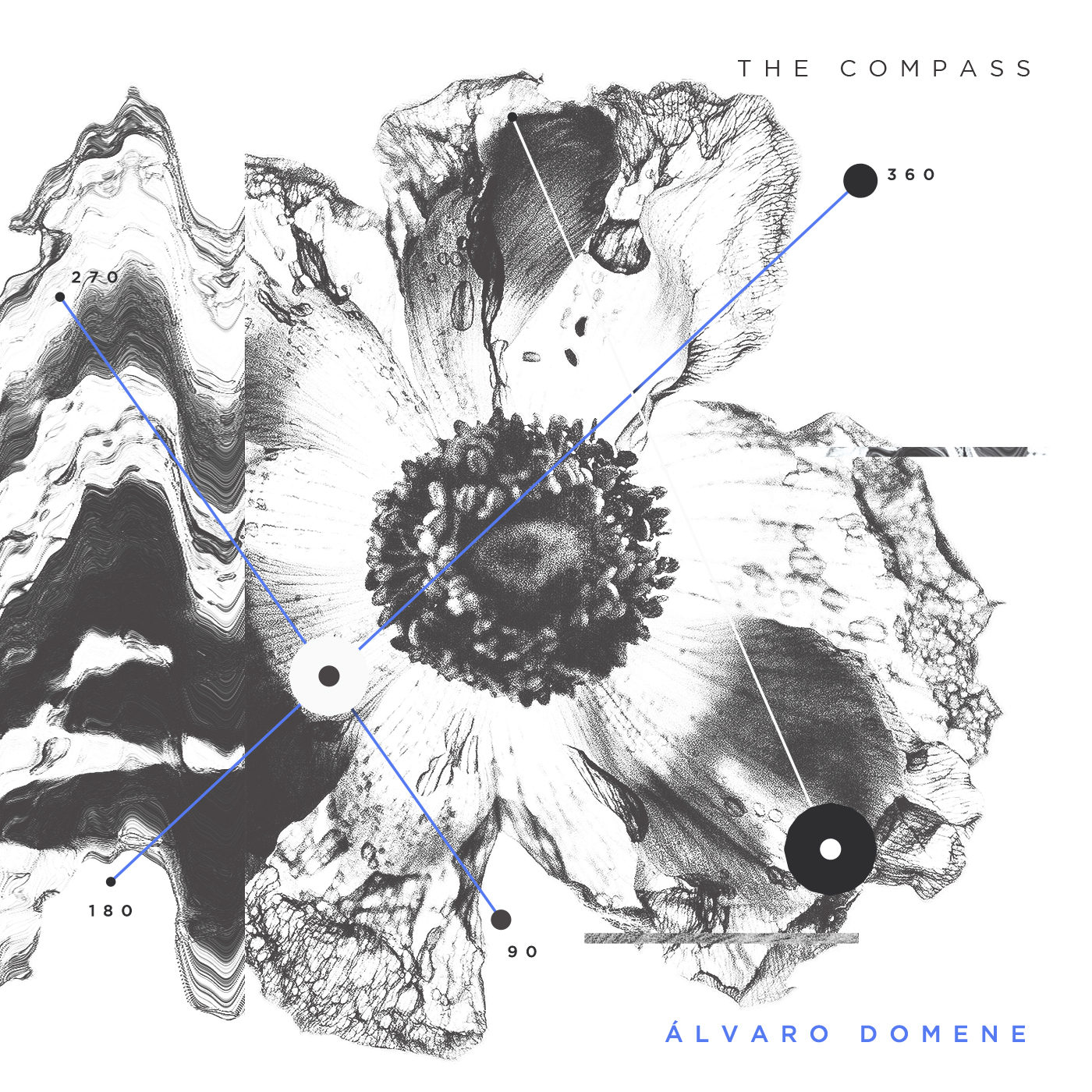
· 6th December 2017·
The New York City Jazz Record newspaper just published an interview that John Sharpe did with me about how Mike Caratti and I run our label, Iluso Records.

· 6th September 2017·
First show with this group at Balboa in Brooklyn. 13th September.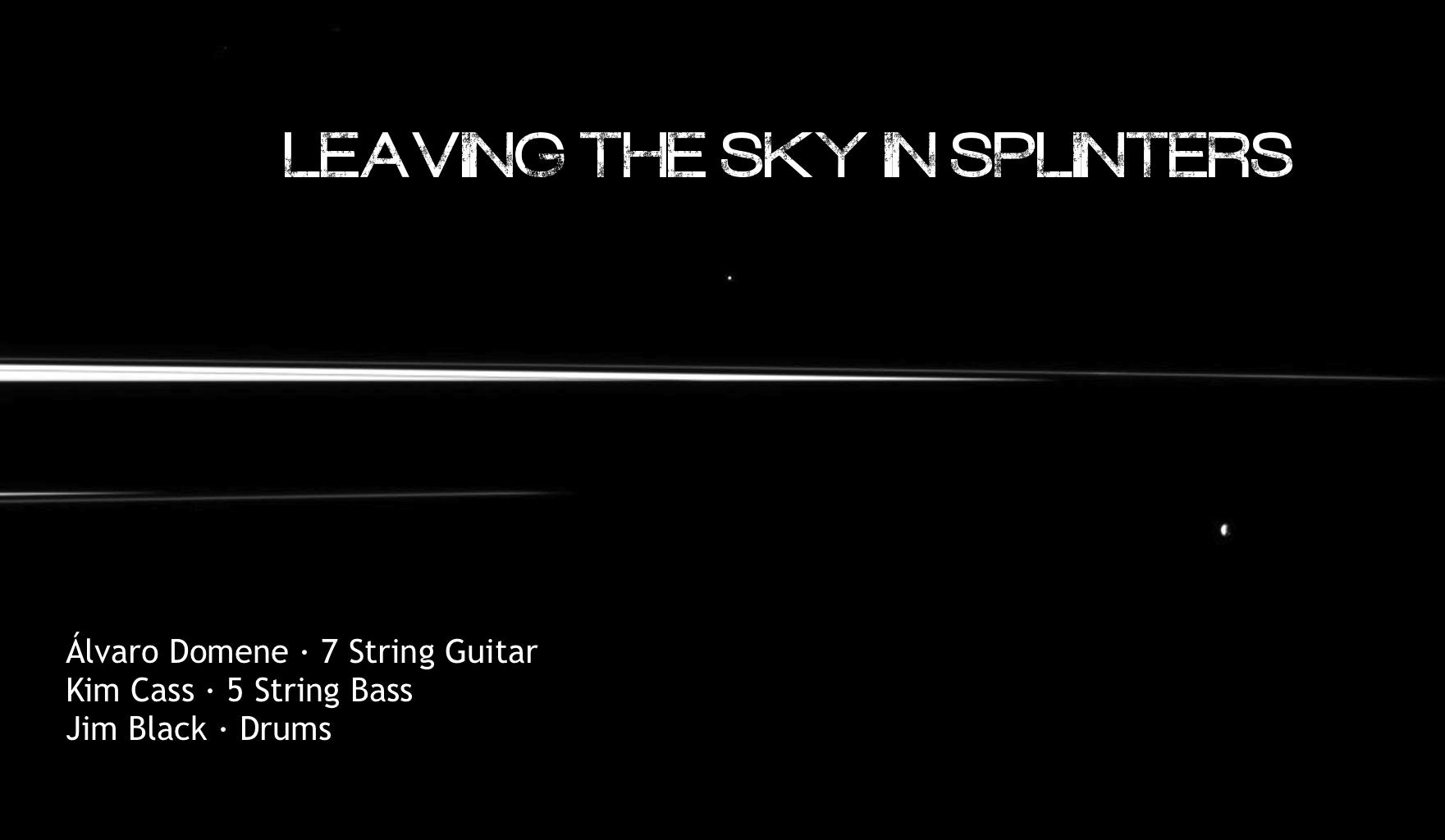
· 13th April 2017·
“Synaptic Self” by dMu is a “determined, furiously dark, animalistic blast of metal-jazz improv…” according to Selwyn Harris’ review in the 20th Anniversary edition of Jazzwise magazine. Both this and “Live at The Firehouse Space” by Domene/Krauss are reviewed in the UK’s best and biggest selling jazz magazine!
· 5th January 2017 ·
-
- Happy to announce that dMu’s “Synaptic Self” made it into the Avant Music News “Best Albums of 2016″ list, and Can this even be called music? “Best of 2016” where it got reviewed by Dave Tremblay:
“On the other side of the listenability spectrum, we find dMu‘s Synaptic Self. Yes, it’s very challenging – and perhaps the least listener-friendly album of the year , but, once you go beyond the initial shock and begin to slowly digest it, you’re rewarded with something so intrinsically unique, so otherworldly, so free, and so raw! It would be quite difficult to find something similar to this elsewhere. It’s also possibly the best album to recommend to other people when you want to aggressively demonstrate your superior tastes to your friends, or lack thereof.”
· 12th December 2016 ·
Positive response from specialized press:
- dMu’s ‘Synaptic Self’ features on Andrey Henkin’s ‘Recommended New Release’ list in the December issue of the New York City Jazz Record.
- Here’s also a review of the same record made by Avant Music News:
This slab of aggression features the trio of Mike Caratti on drums, Josh Sinton on sax and bass clarinet, and Álvaro Domene on electric guitar. Channeling both free jazz and a punk/metal vibe, Domene’s heavily distorted riffing and speed picking are juxtaposed with drones and urgently angular melodies from Sinton. Underneath, Caratti provides staggered rhythms.
All three of these explorers have a penchant for twisting notes, irregular phrasing, and left-of-center explosiveness. Sinton’s bass clarinet, in particular, adds a rich texture to Domene’s doomy grinding. But not all of Synaptic Self is improv. Several tracks are based around pre-established themes, though some of these lead to an open blowout or two.
Comparisons? Slobber Pup’s Pole Axe, for one, but without the quiet parts. A commendable release that explores untrodden paths.
- And last, a review of my CD with Briggan Krauss, “Live at The Firehouse Space”, by Paul Acquaro from The Free Jazz Blog:
Something cool about the Firehouse Space in Brooklyn is that it really is an old firehouse. Now a private residence that opens its doors to creative music, it’s a treat just to visit. The music of saxophonist Briggan Krauss and guitarist Alvaro Domene added some additional experimental luster to the space when they performed the music found here in June of this year.
The opener, ‘Minimum Height to Ride,’ is actually the bulk of the recording at 44 min, while the second track, ‘The Sophomaniac,’ seems to be a 4-minute encore. The atmosphere the duo develops is enveloping, the slow ooze at the start is created by Krauss’ intensely rhythmic phrases and Domene’s deliberate chordal movement. The fog burns off quickly though as the two engage in an intensely percussive passage that raises the tempo and quickens the pulse. Throughout the performance, they move seamlessly from sound-sculpting to earth-scorching.
· 15th September 2016 ·
NEW CD RELEASE
Álvaro Domene & Briggan Krauss: Live at The Firehouse Space (Iluso Records)
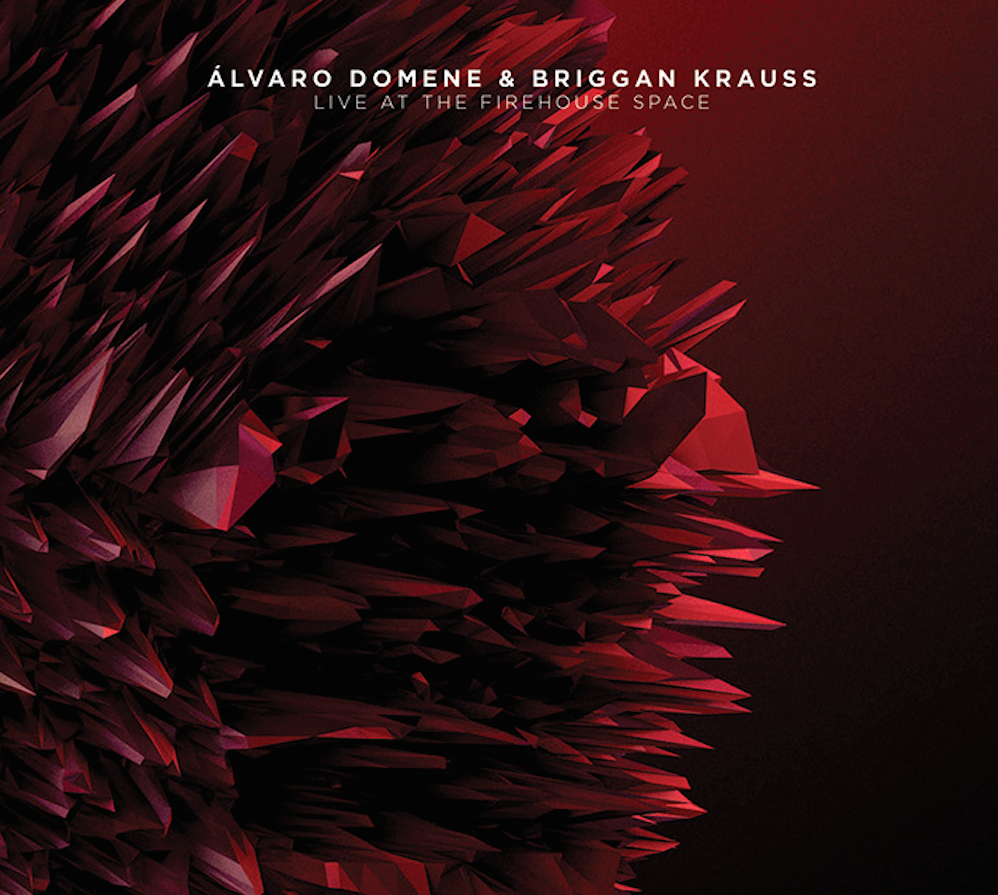
· 25th August 2016 ·
NEW CD RELEASE
dMu: Synaptic Self (Iluso Records)
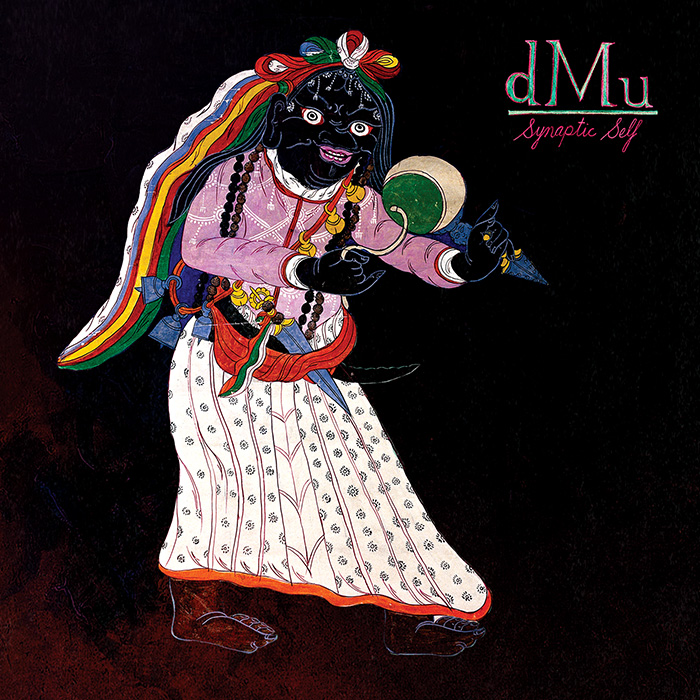
· July 2016: New trio ·
